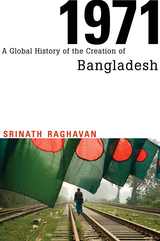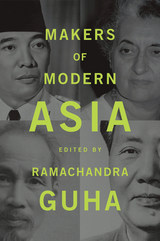
The war of 1971 was the most significant geopolitical event in the Indian subcontinent since its partition in 1947. At one swoop, it led to the creation of Bangladesh, and it tilted the balance of power between India and Pakistan steeply in favor of India. The Line of Control in Kashmir, the nuclearization of India and Pakistan, the conflicts in Siachen Glacier and Kargil, the insurgency in Kashmir, the political travails of Bangladesh—all can be traced back to the intense nine months in 1971.
Against the grain of received wisdom, Srinath Raghavan contends that far from being a predestined event, the creation of Bangladesh was the product of conjuncture and contingency, choice and chance. The breakup of Pakistan and the emergence of Bangladesh can be understood only in a wider international context of the period: decolonization, the Cold War, and incipient globalization. In a narrative populated by the likes of Nixon, Kissinger, Zhou Enlai, Indira Gandhi, Zulfikar Ali Bhutto, Sheikh Mujibur Rahman, Tariq Ali, George Harrison, Ravi Shankar, and Bob Dylan, Raghavan vividly portrays the stellar international cast that shaped the origins and outcome of the Bangladesh crisis.
This strikingly original history uses the example of 1971 to open a window to the nature of international humanitarian crises, their management, and their unintended outcomes.

Hardly more than a decade old, the twenty-first century has already been dubbed the Asian Century in recognition of China and India’s increasing importance in world affairs. Yet discussions of Asia seem fixated on economic indicators—gross national product, per capita income, share of global trade. Makers of Modern Asia reorients our understanding of contemporary Asia by highlighting the political leaders, not billionaire businessmen, who helped launch the Asian Century.
The nationalists who crafted modern Asia were as much thinkers as activists, men and women who theorized and organized anticolonial movements, strategized and directed military campaigns, and designed and implemented political systems. The eleven thinker-politicians whose portraits are presented here were a mix of communists, capitalists, liberals, authoritarians, and proto-theocrats—a group as diverse as the countries they represent.
From China, the world’s most populous country, come four: Mao Zedong, leader of the Communist Revolution; Zhou Enlai, his close confidant; Deng Xiaoping, purged by Mao but rehabilitated to play a critical role in Chinese politics in later years; and Chiang Kai-shek, whose Kuomintang party formed the basis of modern Taiwan. From India, the world’s largest democracy, come three: Mohandas Gandhi, Jawaharlal Nehru, and Indira Gandhi, all of whom played crucial roles in guiding India toward independence and prosperity. Other exemplary nationalists include Vietnam’s Ho Chi Minh, Indonesia’s Sukarno, Singapore’s Lee Kuan Yew, and Pakistan’s Zulfiqar Ali Bhutto. With contributions from leading scholars, Makers of Modern Asia illuminates the intellectual and ideological foundations of Asia’s spectacular rise to global prominence.
READERS
Browse our collection.
PUBLISHERS
See BiblioVault's publisher services.
STUDENT SERVICES
Files for college accessibility offices.
UChicago Accessibility Resources
home | accessibility | search | about | contact us
BiblioVault ® 2001 - 2024
The University of Chicago Press









